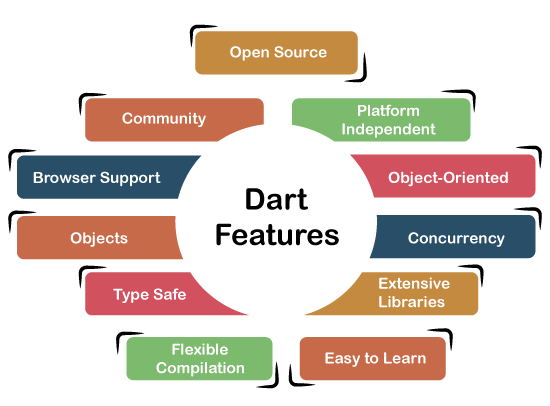Dart FeaturesThe Dart is an object-oriented, open-source programming language which contains many useful features. It is the new programming language and supports an extensive range of programming utilities such as interface, collections, classes, dynamic and optional typing. It is developed for the server as well as the browser. Below is the list of the important Dart features. 
Open SourceDart is an open-source programming language, which means it is freely available. It is developed by Google, approved by the ECMA standard, and comes with a BSD license. Platform IndependentDart supports all primary operating systems such as Windows, Linux, Macintosh, etc. The Dart has its own Virtual Machine which known as Dart VM, that allows us to run the Dart code in every operating system. Object-OrientedDart is an object-oriented programming language and supports all oops concepts such as classes, inheritance, interfaces and optional typing features. It also supports advance concepts like mixin, abstract, classes, reified generic, and robust type system. ConcurrencyDart is an asynchronous programming language, which means it supports multithreading using Isolates. The isolates are the independent entities that are related to threads but don't share memory and establish the communication between the processes by the message passing. The message should be serialized to make effective communication. The serialization of the message is done by using a snapshot that is generated by the given object and then transmits to another isolate for desterilizing. Extensive LibrariesDart consists of many useful inbuilt libraries including SDK (Software Development Kit), core, math, async, math, convert, html, IO, etc. It also provides the facility to organize the Dart code into libraries with proper namespacing. It can reuse by the import statement. Easy to learnAs we discussed in the previous section, learning the Dart is not the Hercules task as we know that Dart's syntax is similar to Java, C#, JavaScript, kotlin, etc. if you know any of these languages then you can learn easily the Dart. Flexible CompilationDart provides the flexibility to compile the code and fast as well. It supports two types of compilation processes, AOT (Ahead of Time) and JIT (Just-in-Time). The Dart code is transmitted in the other language that can run in the modern web-brewers. Type SafeThe Dart is the type safe language, which means it uses both static type checking and runtime checks to confirm that a variable's value always matches the variable's static type, sometimes it known as the sound typing. Although types are required, type annotations are optional because of type interference. This makes it code more readable. The other advantage to being type-safe language is, when we change the part of code, the system warns us about that modification that we have modified earlier. ObjectsThe Dart treats everything as an object. The value which assigns to the variable is an object. The functions, numbers, and strings are also an object in Dart. All objects inherit from Object class. Browser SupportThe Dart supports all modern web-browser. It comes with the dart2js compiler that converts the Dart code into optimized JavaScript code that is suitable for all type of web-browser. CommunityDart has a large community across the world. So if you face problem while coding then it is easy to find help. The dedicated developers' team is working towards enhancing its functionality. Here we have discussed essential features of the Dart language. We will more concepts of Dart language in upcoming tutorials.
Next TopicDart Installation
|
 For Videos Join Our Youtube Channel: Join Now
For Videos Join Our Youtube Channel: Join Now
Feedback
- Send your Feedback to [email protected]
Help Others, Please Share










